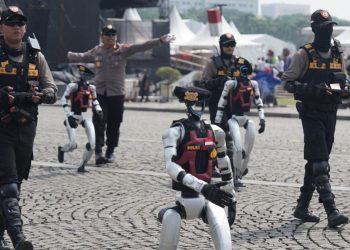Bandung, IndonesiaSentinel.com — Singapore’s establishment of the Digital and Intelligence Service (DIS) highlights the nation’s proactive approach to cyber defense, while Indonesia continues to grapple with growing cybersecurity threats. Despite Singapore’s relatively small size, its cyber defense capabilities are increasingly robust, a stark contrast to Indonesia, where cybersecurity remains a pressing concern amid a surge in cybercrime.
Singapore’s Proactive Cyber Defense Strategy
Singapore’s DIS was established in October 2022 as part of the Singapore Armed Forces (SAF), aimed at defending the country against digital threats, cyberattacks, and information warfare. DIS integrates Singapore’s intelligence, command, control, communications, and cyber protection capabilities, allowing the nation to respond swiftly to cyber threats.
Key features of Singapore’s cybersecurity strategy include:
Government-Led Initiative: DIS was created with government oversight, ensuring strong leadership and resources. It collaborates with government bodies, industry experts, and universities to build a robust cybersecurity infrastructure.
Comprehensive Structure: DIS covers all major aspects of cyber defense, including intelligence gathering, psychological defense, and C4 (command, control, communications, and computers) capabilities, making it a multifaceted approach to national security in the digital age.
Focus on Cyber Warfare: Singapore recognizes the increasing danger of state and non-state actors using cyber warfare as a tool of disruption. The country has prioritized defending critical infrastructure and data against potential cyberattacks that could disrupt essential services or influence elections.
Indonesia’s Struggle with Cybersecurity
Indonesia, on the other hand, faces a different reality. Cybercrime is on the rise in Indonesia, with frequent reports of data breaches, ransomware attacks, and cyber fraud affecting both government institutions and private companies.
The country’s cybersecurity framework has struggled to keep pace with these challenges, and while steps have been taken to improve its defenses, several vulnerabilities remain:
Lack of a Unified Cyber Force: Unlike Singapore, Indonesia does not have a dedicated military unit like DIS to tackle cyber threats. Although discussions around creating a “Cyber Force” have been initiated, including recent proposals by MPR Chairman Bambang Soesatyo, Indonesia’s cyber defense system is currently fragmented. The National Cyber and Crypto Agency (BSSN) handles cybersecurity issues, but its resources and capabilities are often stretched thin.
Frequent Data Breaches: High-profile cases of data breaches have plagued Indonesia in recent years. Government databases, e-commerce platforms, and financial institutions have been frequent targets, often resulting in the exposure of sensitive personal information. These breaches highlight the country’s vulnerability to cybercrime.
Cybercrime Surge: Indonesia has seen an alarming rise in cybercrimes, ranging from hacking and phishing to large-scale fraud schemes. Cybercriminals have exploited loopholes in the nation’s digital security, taking advantage of the rapid digitalization of services without commensurate cybersecurity measures.
Legislative Gaps: While Indonesia has passed laws addressing cybercrime, enforcement remains a challenge. The lack of comprehensive regulations and a coordinated strategy across government institutions has slowed the country’s response to the rapidly evolving cyber threat landscape.
QR Phising also Called Quishing, Emerge as New Cybercrime While Many Still Unaware
Comparing the Two Nations’ Approaches
- Preparedness and Resources:
Singapore has invested heavily in cyber defense, ensuring that its cyber force is well-equipped, technologically advanced, and closely integrated with national security agencies.
Indonesia, by contrast, still faces challenges in terms of resources and coordination. While the BSSN is tasked with managing cybersecurity, it lacks the specialized capabilities of a military unit like Singapore’s DIS.
- Speed of Implementation:
Singapore swiftly established DIS in response to the evolving threat of cyber warfare. It has placed a priority on securing critical digital infrastructure to mitigate the risks posed by state and non-state actors.
Indonesia’s response has been slower, with ongoing discussions about the creation of a dedicated Cyber Force. The country’s cybersecurity infrastructure remains a work in progress, as highlighted by recurring data breaches and cybercrime cases.
- Legal and Policy Frameworks:
Singapore has a clear, well-defined policy framework for addressing cyber threats, and the establishment of DIS is a key component of this strategy. Its government-led initiatives ensure that cybersecurity is a national priority.
Indonesia’s legislative efforts have been fragmented, and while there are laws addressing cybercrime, enforcement has proven difficult. The country has yet to fully implement a cohesive cybersecurity policy that integrates all government and defense sectors.
Singapore has set a high standard for cybersecurity with its dedicated Digital and Intelligence Service, positioning the country as a leader in cyber defense within the region. Indonesia, meanwhile, faces an uphill battle in addressing its cybersecurity shortcomings amid rising cybercrime.
While discussions around the formation of a Cyber Force are promising, the nation needs to accelerate its efforts to build a robust cybersecurity framework that can effectively combat the growing threats in the digital age. As Indonesia moves forward, it can look to Singapore’s model for insights into how to create a unified, well-resourced approach to defending its digital frontiers.
(Raidi/Agung)

























